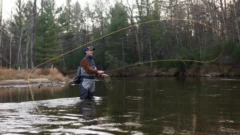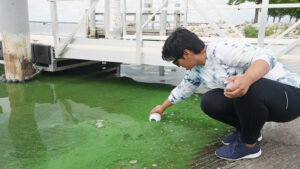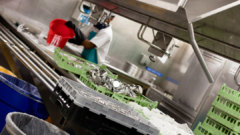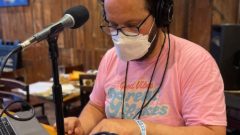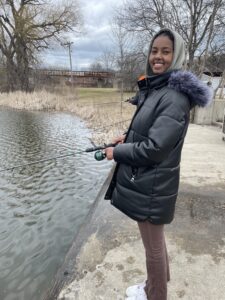Podcast Miniseries Highlights Stories of Wisconsin Communities Impacted by PFAS Pollution
This week, Wisconsin Sea Grant and Midwest Environmental Advocates launched Public Trust, a new podcast miniseries that explores Wisconsin’s response to PFAS contamination. Host Richelle Wilson visits communities impacted by these toxic “forever chemicals” to understand how local residents have been affected and what they’re doing to secure their rights to clean water. The miniseries is presented as part of the award-winning The Water We Swim In podcast.
Wisconsin Sea Grant video and podcast producer Bonnie Willison traveled with Richelle to French Island and Peshtigo to conduct interviews with community members. “Many of us take clean drinking water for granted, so hearing from these Wisconsinites on the front lines of PFAS contamination is sobering. I’m glad I’m able to help bring these voices to the public through our partnership with Midwest Environmental Advocates,” said Willison.
Preview the podcast series here.
The first episode of Public Trust takes listeners to the small town of Campbell on French Island to find out what it’s like when an entire community can no longer safely use its tap water. French Island resident and local official Lee Donahue takes listeners on a tour of the neighborhood and tells the story of how local drinking water was contaminated by PFAS-containing firefighting foam used at the La Crosse Airport.
Not only are Lee Donahue and her neighbors telling their stories, they’re also actively engaged in advocating for new environmental health protections, including a statewide groundwater quality standard for PFAS. While Wisconsin has a water quality standard that limits the level of PFAS in municipal drinking water, there’s no equivalent standard for groundwater. That’s a problem for communities like French Island, which depend entirely on private wells for their drinking water.
Later in the series, Public Trust takes listeners to the communities of Peshtigo and Marinette, where for years, local residents have been engaged in a David-and-Goliath battle with a major firefighting foam manufacturer that has polluted their drinking water and created one of the largest sites of PFAS contamination in the country.
The series concludes with a trip to the northwoods, where Wisconsin Sea Grant emerging contaminants scientist Gavin Dehnert is working with the Great Lakes Indian Fish and Wildlife Commission to look for PFAS in tribally-harvested goods like wild rice, maple sap, and walleye.
Public Trust can be found here or wherever they get their podcasts.
The post Podcast Miniseries Highlights Stories of Wisconsin Communities Impacted by PFAS Pollution first appeared on Wisconsin Sea Grant.News Releases | Wisconsin Sea Grant
News Releases | Wisconsin Sea Grant
https://www.seagrant.wisc.edu/news/publictrust/

